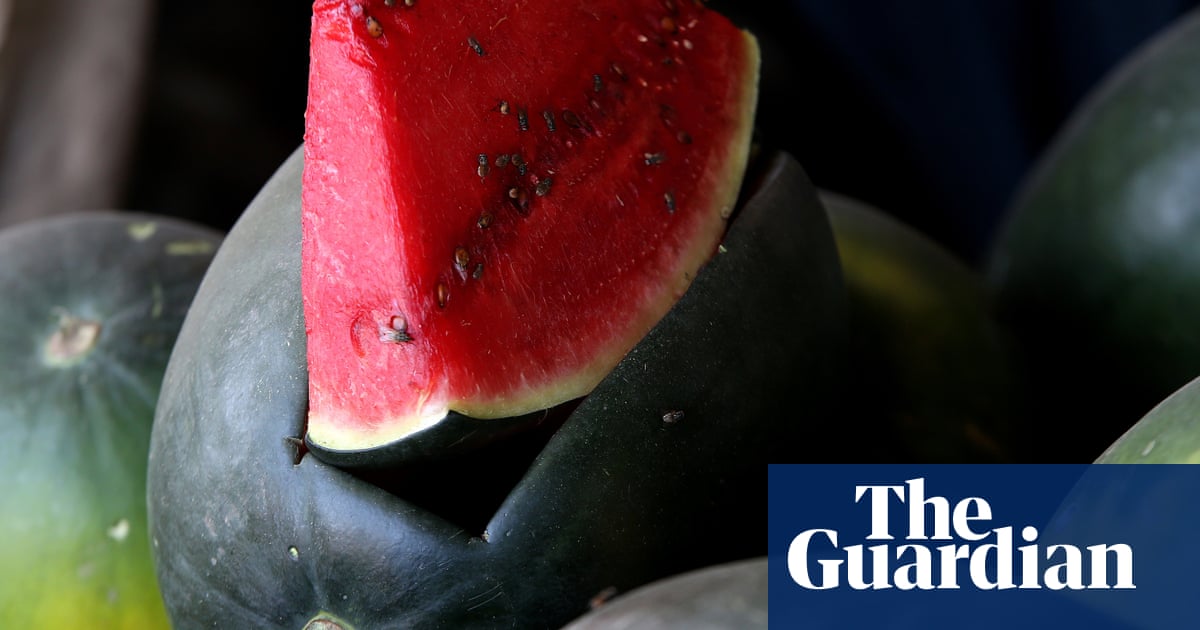Selling Watermelons
Moscow is milling with watermelons.Everything breathes a boundless freedom.And it blows with unbridled fiercenessfrom the breathless melonvendors.
Stalls. Din. Girls’ headscarves.They laugh. Change bangs down. Knives —
and a choice sample slice.— Take one, chief, for a long life!Who’s for a melon?Freshly split! —
And just as tasty and just as juicy arethe capbands of policemenand the ranks of motor-scooters.The September air is fresh and keenand resonant as a watermelon.
And just as joyfully on its own tackas the city-limit melon-multitudes,the earth swings in its great string-bagof meridians and latitudes!
The Moscow-born poet Andrei Voznesensky (1933-2010), was one of the “Thaw Poets”, the experimental and politically argumentative young writers who emerged in the USSR during the de-Stalinisation era of Nikita Khrushchev. Their regular informalreadings in Mayakovsky Squareattracted enthusiastic audiences between the late 1950s and 1961, when they were temporarily banned.
As a young teen, Voznesensky had sent some verses to Boris Pasternak and been thrilled by the warm response. Perhaps this was an important source of his literary self-confidence. But the boldness seems to have been tempered by a certain personal tact. His early collection, Mozaika, was withdrawn and the publisher, apparently, fired. In 1963, at a Kremlin meeting between writers and artists and the Soviet government, Khrushchev, whose liberalising instinct didn’t extend to questioningsocialist realism, rounded on him and demanded he leave the country. Somehow, Voznesensky evaded the worst outcome: he wrote what has been described as an “ironic recantation” for Pravda, and continued to publish and recite his work. He went on to achieve a rock-star level of fame, giving sell-out readings in both the USSR and abroad. He was awarded the Soviet state prize in 1978.
Selling Watermelons is the kind of poem that would please and amuse the home crowd. It’s a gutsy celebration of the suddenly overwhelming seasonal glut of a very desirable product. There’s no moaning about scarcity, although the string-bag mentioned in the last verse is a clue. It was stowed in every shopper’s pocket, just in case a previously unavailable item had suddenly appeared. Now, in the glory of the “melon-multitudes” the bag would be stretched as wide as possible to contain the delicious import – which had probably travelled from Kherson.
Edwin Morgan’s translation is alive to the breathless excitement, the counter-sensation of suddenly being able to breathe freely, and the deliciously demonstrative aspect of the whole event. Vendors with busy knives prepare sample slices: customers’ knuckles tap the surface of the uncut fruit to check for that inimitable “resonance” of ripeness. The exhilaration that fills the sharp September air has, of course, a political dimension but this is understated, subsumed in an expression of joy that unites the people and those in power over them.
Commended as a Russian translator particularly for his rendering of Mayakovsky into Scots,Morgan (1920-2010), gets the muscles of the English language working with similar vigour in his treatment of Voznesensky. He was a faithful linguistic traveller, not a version-maker, but there are small, important innovations in Selling Watermelons. For instance, assuming the online version of the poem is correctly laid out, the original stanza structure is altered: Voznesensky has three two-lined stanzas, Morgan, only one. This greater compression may reflect Morgan’s concern with emphasising the zingy alliterative contrasts that make all of Voznesensky’s original lines so exciting. Morgan’s lineation jostles the milder English sounds closer together for added impact.
There are bold decisions concerning particular words, especially in the first stanza. In the opening line (“Moscow is milling with watermelons”) the original verb, “авалена”(“overloaded”), emphasises quantity rather than movement. Besides avoiding the passive case, Morgan’s present participle, “milling” introduces a verb that evokes weight and, above all, movement. Crowds are “milling” as in the conventional metaphor, and watermelons are constantly changing hands: so, “Moscow is milling with watermelons”. It’s simple and right. “Melonvendors” is another stroke of brilliance. It avoids the Voznesensky’s gender-specific rhyme-word, “продавщиц”,(“saleswomen”) and adds a kind of sound effect.
Abundance for Voznesensky creates a mood of freedom, a sense of boundlessness, but his portrait of the city as an image of the prevailing politics is realistic. Perhaps the “chief” invited to “take one” is a party boss recognised by the vendor? Satisfyingly, briefly, power has passed to the latter. It’s in the first lines of the fourth stanza that a more noticeable bit of political mischief appears: “And just as tasty, and just as juicy are / the capbands of policemen”. It’s clearly a joke, but it’s still “edgy”: a military policeman in a good mood could laugh, but, on another day, treat it as an insult.
The last quatrain opens out into an image in which the watermelon, ferried home in its plumped-out bag, becomes the world: “the earth swings in its great string-bag / of meridians and latitudes”. It’s as if the markings on the melon’s skin had suggested a vision of the Earth, and all the joyful possibilities of “latitude” and adventure it might hold. These were possibilities ultimately realised by Voznesensky. How grieved he would be that the young poets of present-day Russia, Artyom Kamardin and Yegor Shtovba,cannot share such exhilaration.
Selling Watermelons is published in Edwin Morgan’sCollected Translations. The Russian original, Торгуют арбузами, isprinted hereand memorablyperformed here.
